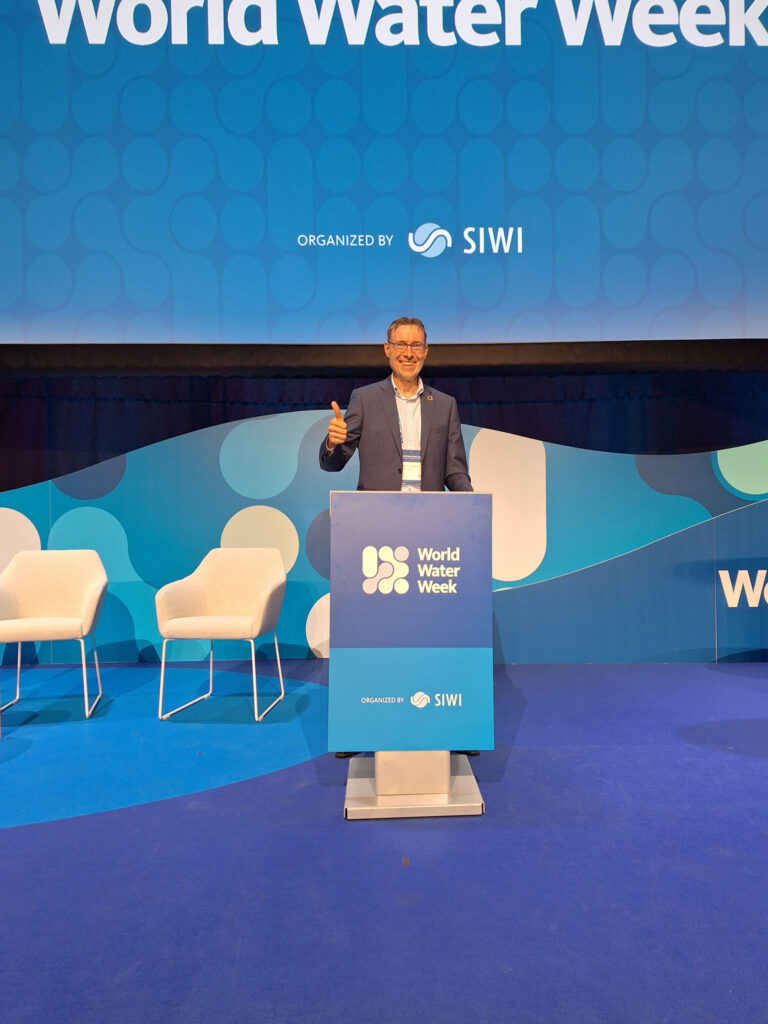‘Water for food requires collaboration’
Picture: Shutterstock / Sk Hasan Ali
Droughts, floods and rising sea level: the world will increasingly face water problems. This has implications for our food supply, argues Anthony Verschoor. At the World Water Week he attended last week, he saw a lot of interest from companies, governments and development banks in making agriculture more water efficient. The Water Science for impact congress, to be held soon, is timely.
Sufficient clean water is the basis of our existence. Most of the United Nations’ Sustainable Development Goals can only be met if people have sufficient access to water. It is therefore great that so much attention was paid to the importance of water in all its facets during World Water Week in Stockholm last week. Elsewhere, the importance of water is often overlooked. We talk a lot about climate change, for example. And that is important. But as Dutch water envoy Meike van Ginneken rightly said last week, climate change is most tangible through its effect on water. Think about drought, salinisation, flooding and sea level rise.
Food requires water
The focus on water is good, but we talk too little about the importance of water for the food system. The elephant in the room is that we depend on water for our food supply. And due to water scarcity, flooding, salinisation or pollution of water, that food supply is increasingly at risk. Seventy per cent of our scarce fresh water is already used in agriculture and in the food system that ensures we have food on our plates. Demand for food is rising in future, but agriculture has in many cases not yet become more efficient in dealing with scarce water. Much remains to be done. How do we handle that precious water?
Meltwater
The water demand of agriculture and food systems deserves much more attention. Hester Biemans demonstrated this at the opening of the academic year of Wageningen University this week, which focused on the connection between water and food. Climate change is making river water runoff from the Himalayas less predictable, putting the food supply of 2 billion people at risk. This calls for a different design of agriculture. In countries like Jordan or elsewhere in the Middle East and Africa, drought threatens agriculture. There, we need to be more careful with groundwater for irrigation.
Investment
New agricultural projects, like large-scale irrigation projects, often don’t take the natural replenishment of water in account. Drilling deeper and deeper for groundwater is common, as is soil salinisation or inadequate water supply for vulnerable groups. Development banks that finance such projects should look beyond the short-term profitability of the project: a sustainable food system starts with a healthy foundation.
Integrated systems approach
During World Water Week, development banks, companies, governments and other knowledge institutions showed to be interested in WUR’s approach to such problems. WUR uses a systems approach that helps to develop new solutions together with all stakeholders. These are often very complicated questions. But we do like a challenge. And in Wageningen, we are good at integrating technical knowledge with socio-economic knowledge. This is necessary, because everyone in the food and water system needs to be involved and work together to meet the challenges. By making water leading in land use planning and in the food systems that produce our food, we can achieve more together.
Collaboration
Fortunately, we are seeing more and more cooperation between parties in the field of water and agriculture in the Netherlands. At World Water Week, the Netherlands Water Partnership, the Netherlands Food Partnership and four Dutch ministries present (EZ, IenW, LVVN, BuZa) emphasised the importance of cooperation at the interface of food and water.

Cooperation is also at the heart of WUR’s water vision, which we drafted last year. As a consequence of the growing cooperation within WUR in the field of water, we will organise the congress Water@WUR: Science for Impact on 17 September. At this meeting, we will discuss various current water-related issues. We look forward to meeting you there. Everyone, especially people from outside WUR, is welcome.

